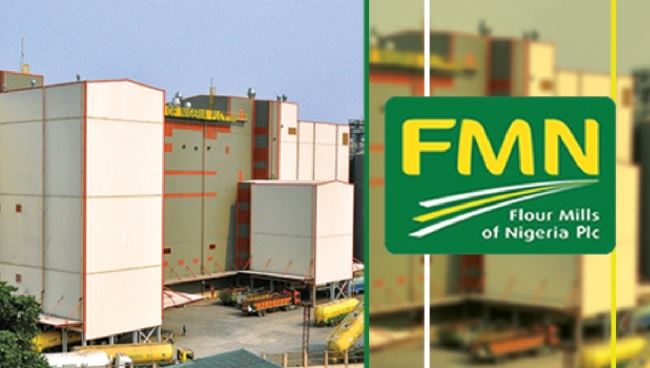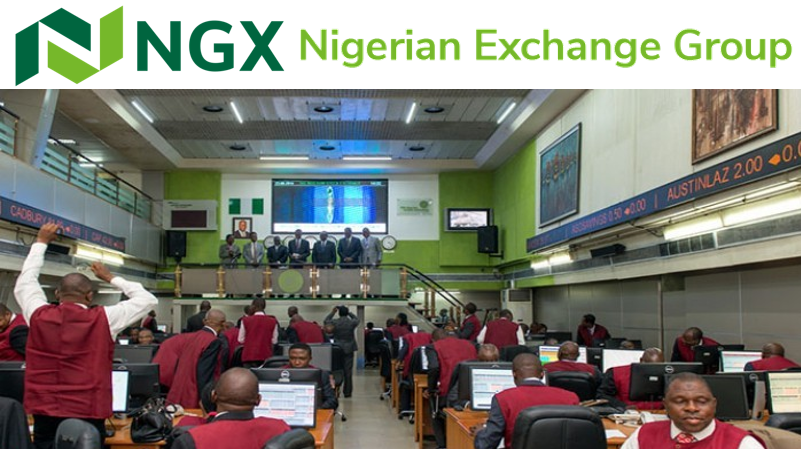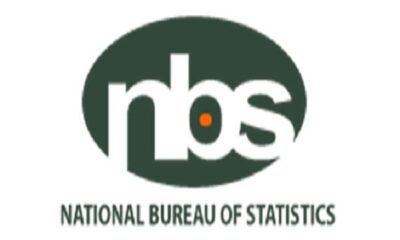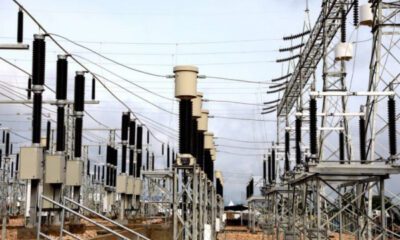Business
Economist tasks NBS on proper reflection of maritime’s contribution to GDP
By Seun Ibiyemi
An Economist, Dr Muda Yusuf, has charged the National Bureau of Statistics (NBS) to engage stakeholders of the maritime sector to appropriately capture its contribution to the Gross Domestic Product (GDP).
Yusuf, also Founder, Centre for the Promotion of Private Enterprises (CPPE), gave the advice on Sunday in Lagos.
The News Agency of Nigeria (NAN) reports that the National Bureau of Statistics (NBS) on Friday posted a 3.54 per cent GDP growth in the second quarter of 2022.
This marks the seventh consecutive quarterly GDP growth since Nigeria’s exit from recession in the fourth quarter of 2020.
According to the NBS, real sector: agriculture, manufacturing, construction, road and air transportation, financial services, information and communication technology, trade and real estate recorded varying degrees of growth.
Sectors that contracted include: oil refining, rail transportation, crude oil and gas, metal ores, electricity vehicle assemblies, electricity and air-conditioning, motion pictures, music and textiles.
Yusuf said that the maritime sector’s contribution to GDP, which was very critical in the international trade process and generated appreciable revenue, was evidently under-reported.
“For instance, in the Q2 GDP report, the maritime sector (water transport) was said to have contributed a mere N2.4 billion to the GDP out of N45.5 trillion GDP for the quarter; a mere 0.01 per cent.
“In the first quarter of 2022, the NBS recorded 0 per cent contribution of the sector to GDP.
“In the GDP numbers, water transport is the only proxy closest to maritime but maritime sector activities are beyond water transportation.
“We, therefore, appeal to the National Bureau of Statistics to engage with stakeholders in the maritime sector to ensure a proper capturing of the activities of the sector and the contributions of the sector to the national economy.
“This remedy on data quality is critical for planning and investment,” he said.
Yusuf said key drivers of the contractions included continued inactivity of the country’s major refineries, cloud of insecurity hovering over the railway system, crude oil theft and vandalisation of oil facilities in the oil producing areas and inclement operating environment for businesses.
He said the GDP report further underlined the dominance of the non-oil sector which accounted for 93.67 per cent of the GDP while the oil sector accounted for 6.63 per cent.
He, however, noted that the oil sector continues to play a leading role in the generation of foreign exchange and a significant role in the generation of government revenue.
“This underscores the persistent productivity challenges which has continued to characterise the non-oil sector of the economy seeing that the non-oil contribution to our export earnings is still less than 5 per cent,” he said.
Yusuf tasked government to address challenges of the massive oil theft, provide safety for the oil facilities and implement the Petroleum industry Act to reverse the under performance of the oil and gas sector.
He added that the electricity sector reforms needed a review to improve efficiency and productivity in the sector.
According to him, the challenges in the electricity supply chain needs to be urgently addressed from gas to power, transmission, distribution, energy pricing, metering, and the capacity of the distribution companies.
He stated that there was the need to put fiscal incentives in place to boost investment in renewable energy in line with the energy mix objective of government.
“Such incentives could be in the areas of tax incentives and the waivers of import duty on renewable energy equipment.
“There is an urgent need to decentralise the national grid for ease of management and efficiency and there should also be a deliberate policy to attract private investment in the electricity grid,” he said.
He also tasked government to revive the textile sector by ensuring that all uniforms of security agencies and other government institutions are produced from local textile fabrics.
Business
Odu’a Investment declares N1.961bn profit, up 62%


By Atokolo Emmanuel Adejo
Odu’a Investment Company Limited, at its 42nd annual general meeting, has declared N1.961 billion profit before tax.
The 42nd annual general meeting of the erudite Odu’a Investment Company limited was held at the Oranmiyan Hall, Lagos Airport Hotel yesterday. Present at the meeting were stakeholders and SSGs to the six South Western states that make up the Odu’a.
The group chairman, Otunba Ashiru, said the company had gained a modest seven percent growth in Operating Revenue which stood at N3.68 billion in 2022 and glided upwards to N3.95 billion in 2023 despite the volatility in the economy in 2023. In view of this, the company announced a significant N1.961 billion profit before tax. In the cause of the meeting, the stakeholders approved the resolutions brought forward by the board and also the company’s financial statements for the financial year. It was also agreed that a cash dividend be paid to the stakeholders.
The Group chairman was careful to point out the most notable events in the said year under review were the commissioning of the Phase 1 Westlink Iconic Villa in Ibadan that housed 67 residential units of three bedroom apartments, 4 and 5 bedroom state of the art duplexes, launching of the Odu’a Investment Foundation and its flagship, Educational Intervention Project tagged Digital Education For Innovation And Economic Development.
The high point was when an applause filled the air when he announced that they received the first ever rating in the year under review as Augusto and co after a scrutinised audit awarded the company with an ‘A’ Rating with a stable outlook which was credited to its “deft management and also good operating cash flow supported by its diversified income streams and portfolios of subsidiaries and associates.”
The Group Managing Director/CEO, Mr Adewale Raji, was emotional as he announced he will be retiring on the 31st of May, 2024 after being a solid foundation in upholding the interest of the stakeholders for 10 years as a result of serving two successive terms. In his statement, he noted that Mr Abdulrahman Yinusa will be taking over the mantle of overseeing the management of the esteemed company.
He further said that the recorded success they achieved was solely due to the fact that the team and stakeholders he worked with shared a common interest and that was business. One of the stakeholders in his testimony of the retiring Group Managing Director stated that Mr Raji was not interested in political gains while serving and this helped curb issues that may have arisen due to political party crisis in the company.
The outgoing MD noted that it was not all rosy during the 10 years but with good colleagues and words of encouragement from stakeholders helped him pull through, he also not forgot to mention the support and prayers of his wife and family. According to him, a key strategy modeled for 2025 which is SRC (Sweat, Revive, Create). It was aimed at modeling the company to be a lean non operating investment holding company that focuses on Real Estate, Hospitality, Financial Services, Agriculture, Energy/ Power, ICT/Digital, Logistics/e-commerce, Health Care/Pharmaceuticals.
According to him, he noted that, “in real terms, OICL Profit Before Tax for 2023 actually increased by 62 percent to N1.772 billion from N1.092 billion in 2022 if we strip off Revaluation Gains arising from our Investment Properties portfolio in both years. He also recounted that the financial year 2023 will be the 10th consecutive year that the company will be paying dividends to Shareholders with the cumulative amount paid in this past decade amounting to N3.11 billion.”
In his closing remark, he expressed full confidence when stating that the management of the company is in safe hands in the person of Mr Abdulrahman Yinusa, noting that he has the capacity to further take the company to greater heights.
The stakeholders were also full of praise for the outgoing MD and the Emeritus Chairman, Mr Segun Aina for anchoring the company steadily and appealed to them not to shy away from activities that involve Odu’a.
The Chairman, when asked by our reporter how FX negatively impacted business for them and how they were able to stay afloat, responded by saying they FX was a general issue but they ensured that their portfolios had enough funds in it that will keep them going, he also encouraged the stakeholders to strengthen their portfolios financially.
Business
Flour Mills among top gainers as investors make N303bn


Investors in the Nigerian equities market went home with N303 billion after the bourse resumed from the Workers Day holiday on Thursday.
The Federal Government declared Wednesday a public holiday to mark the May Day celebration across the country.
The rise in market capitalisation followed the growth in share prices of Presco Plc, Flour Mill, Sterling Bank, and Dangote Sugar, amongst others at the end of trading today.
After five hours of trading at the capital market, the equity capitalisation increased to N55.8 trillion from N55.5 trillion posted by the bourse on Tuesday.
Similarly, the NGX-All-Share Index (ASI) increased to 98,762.78 from 98,225.63 recorded the previous trading day.
The market breadth was positive as 28 stocks advanced, 14 declined, while 78 others remained unchanged in 8,446 deals.
Presco Plc and Flour Mill led other gainers with a 10 percent growth in share price to close at N229.90 and N33.55 from their previous prices of N209.00 and N30.50 per share.
Sterling Bank and Dangote Sugar also raised their share prices by 9.98 percent, and 9.90 percent respectively.
On the flipside, NASCON led other price decliners as it shed 9.99 percent off its share price to close at N47.30 from the previous N52.55 per share.
UPL, OMATEK, and NEIMETH completed the list of losers in today’s trading with -9.29 percent, -9.21 percent, and -9.09 percent dip in their share price respectively.
On the volume index, Abbey Mortgage Bank traded 362.820 million shares valued at N907 million in 16 deals followed by Access Corporation which traded 54.466 million shares worth N954 million in 980 deals.
Veritas traded 38.748 million shares valued at N230.56 million in 103 deals.
Access Corp recorded the highest value for the day, trading stocks worth N954 million in 980 deals followed by Abbey Mortgage Bank which traded equities worth N907 million in 16 deals.
Nigerian Breweries traded stocks worth N802 million in 191 deals.
Business
NGX: ASI, market cap record gains


The NGX All-Share Index (ASI) on Thursday advanced by 0.55 percent to close at 98,762.78 basis points.
This is compared to the previous day’s gain of 0.35 percent to close at 98,225.63 basis points. The NGX Market CAP also recorded a gain of N303.79bn Naira terms.
The total volume traded advanced by 20.46 percent to close at N665.20m, valued at N5.54bn and traded in 8,446 deals. ABBEYBDS was the most traded stock by volume, with N362.82m units traded, while ACCESSCORP was the most traded stock by value, with N954.62m units traded.
The Gote Index advanced by 0.27 percent to close at 345.08 basis points, The Toni index advanced by 1.24 percent to close at 1,306.33 basis points, while the Samad index closed flat with 326.45 basis points.
At the close of trading, the market recorded 29 gainers, 14 losers, and 81 unchanged. FLOURMILL topped the gainers’ list, while NASCON topped the losers’ list.
The value chart also revealed that ACCESSCORP contributed the most, with a 17.23 percent share. ABBEYBDS and NB followed closely behind.
-
capital market2 years ago
Rt.briscoe, FBNH, Others halts negative performance of stock market
-
Finance3 months ago
Court orders Sen. Victor Umeh to repay N136m bank debt to AMCON
-



 Abuja Update2 months ago
Abuja Update2 months agoUNDP, FG partnership needed to achieve inclusion, equity- Minister
-
Abuja Update1 month ago
Banks drive stock market performance with N147bn gain
-



 Business1 week ago
Business1 week agoTingo Group unveils Tingo Electric, Tingo Cola drink at Lagos launch
-



 Health2 weeks ago
Health2 weeks agoCapacity training will reduce migration of health workers- NPHCDA
-
News4 months ago
Oil thieves sponsoring malicious media campaign against Navy – Spokesman
-



 Infotech1 month ago
Infotech1 month agoWorld Backup Day: NITDA urges Nigerians to ensure backup of data












